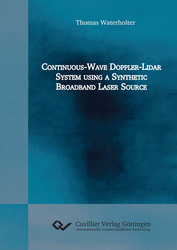| Fachbereiche | |
|---|---|
| Buchreihen (97) |
1382
|
| Nachhaltigkeit |
3
|
| Gesundheitswesen |
1
|
| Geisteswissenschaften |
2379
|
| Naturwissenschaften |
5409
|
| Mathematik | 228 |
| Informatik | 320 |
| Physik | 980 |
| Chemie | 1365 |
| Geowissenschaften | 131 |
| Humanmedizin | 243 |
| Zahn-, Mund- und Kieferheilkunde | 10 |
| Veterinärmedizin | 108 |
| Pharmazie | 147 |
| Biologie | 835 |
| Biochemie, Molekularbiologie, Gentechnologie | 121 |
| Biophysik | 25 |
| Ernährungs- und Haushaltswissenschaften | 45 |
| Land- und Agrarwissenschaften | 1005 |
| Forstwissenschaften | 201 |
| Gartenbauwissenschaft | 20 |
| Umweltforschung, Ökologie und Landespflege | 148 |
| Ingenieurwissenschaften |
1798
|
| Allgemein |
97
|
|
Leitlinien Unfallchirurgie
5. Auflage bestellen |
|
Erweiterte Suche
Continuous-Wave Doppler-Lidar System using a Synthetic Broadband Laser Source
Thomas Waterholter (Autor)Vorschau
Inhaltsverzeichnis, PDF (43 KB)
Leseprobe, PDF (82 KB)
In this thesis a new concept of continuous wave (CW) Lidar for detection of scattered light from atmospheric aerosol particles is presented. It is useful in particular for remote sensing of wind velocities but can be easily applied to the fields of remote vibrometry and differential absorption lidar (DIAL) as well. It is based on a low-coherence interferometric setup powered by a synthetic broadband laser source with Gaussian power density spectrum. The laser bandwidth is electronically adjustable and determines the spatial resolution which is independent of range. The Lidar system inherently offers strong discrimination between signal contributions from different locations and has no moving parts. The location to be re solved can be shifted numerically after the measurementmeaning that a singlemeasurement already contains the full range information. These features of constant resolution and numerical range scanning are in sharp contrast to conventional CW Lidar systems. Despite strong suppression of signals that are not of interest, spurious reflections from inside the setup can be extremely large when compared to the weak scattering signals to be detected and should be kept as low as possible. To remove the remaining impact of such disturbances, the system offers an elegant solution through a numerical shift/filtering/backshift procedure.
| ISBN-13 (Printausgabe) | 9783736990593 |
| ISBN-13 (E-Book) | 9783736980594 |
| Buchendformat | A5 |
| Sprache | Englisch |
| Seitenanzahl | 130 |
| Umschlagkaschierung | matt |
| Auflage | 1. Aufl. |
| Erscheinungsort | Göttingen |
| Promotionsort | Hamburg-Harburg |
| Erscheinungsdatum | 03.08.2015 |
| Allgemeine Einordnung | Dissertation |
| Fachbereiche |
Physik der kondensierten Materie (einschließlich Festkörperphysik, Optik)
Mess- und Regelungstechnik Elektrotechnik Allgemeine Elektrotechnik Energietechnik |
| Schlagwörter | Doppler, Lidar, OLCR, Coherence, Interferometry, DIAL, Vibrometry, Atmospheric optics, Fiber optics, Remote sensing and sensors, Aerol detection, Atmosperic scattering, Backscattering |








